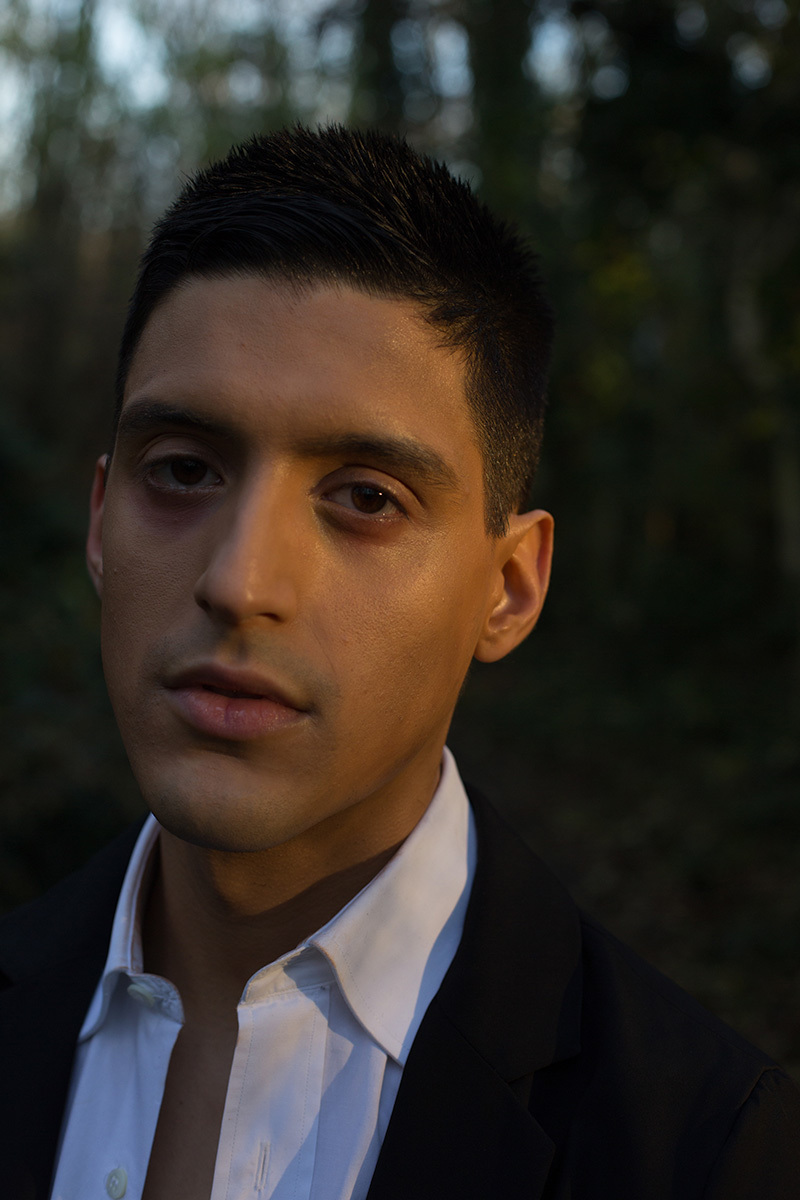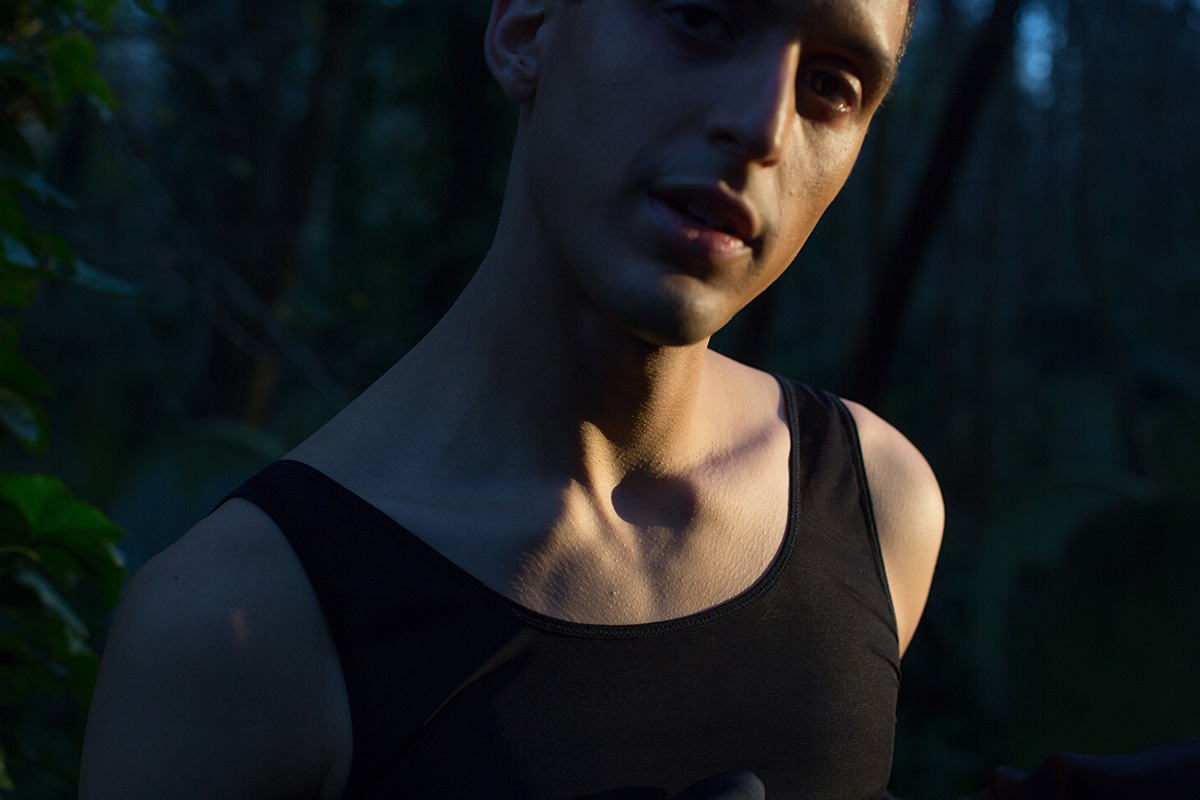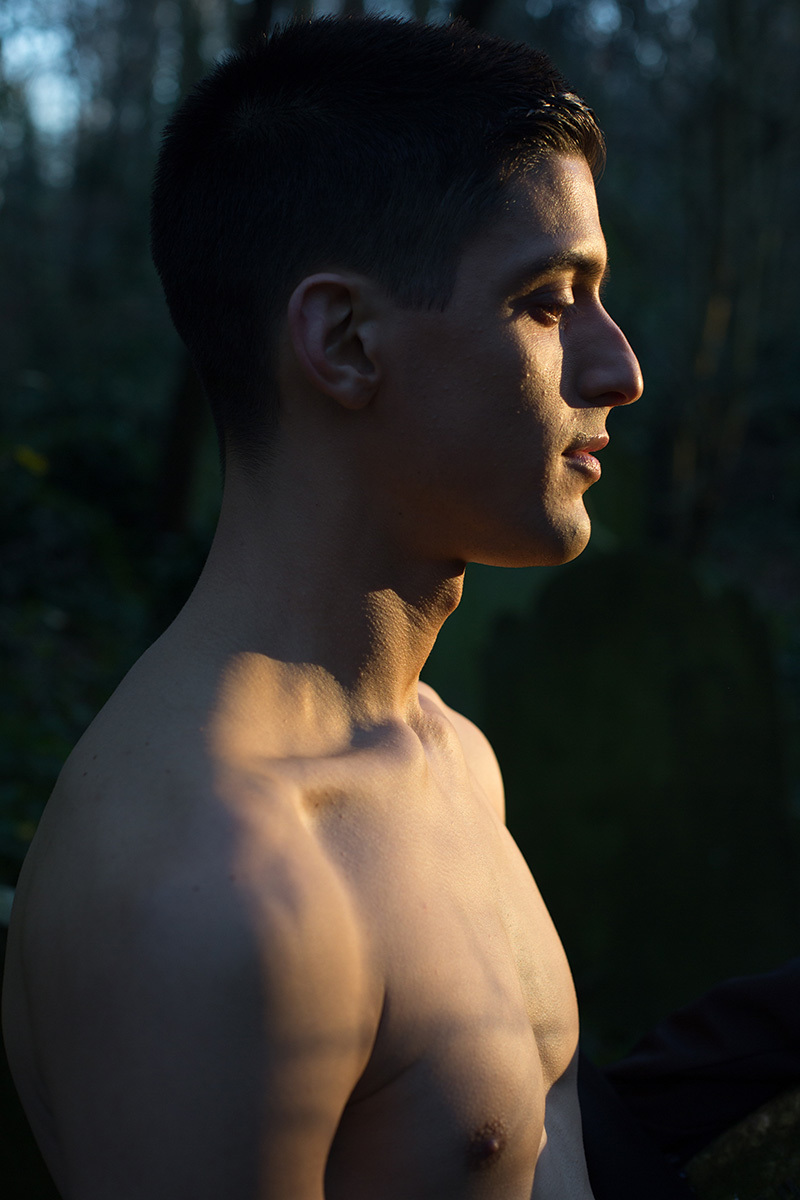On his first two albums, Xen and Mutant, Arca cultivated a rare sensibility in the broad church of dance music. His was a world that conjured up countless superlatives and adjectives; the records were full of skittering and flittering rhythms, plunging deep bass, soaring, glimmering lines of melody. His obvious talent meant that, at just 23, he was producing beats for Kanye West, working with FKA Twigs, and of course, co-producing and co-writing many of the tracks off Bjork’s Vulnicura. Now, on label XL, he’s about to release his self-titled third album. Notably, it sees Arca in full Baroque splendor, singing for the first time in his native Spanish. His voice, full of mournful and elegiac grandeur, turns tragedy into magnificence. It’s a daringly open album, pure, fragile and sincere, full of wounded experimental electronic majesty. Close friend and collaborator Wolfgang Tillmans turned his lens on Arca for i-D, before turning on his dictaphone to talk pop, politics, and turning the sadness in the world into something beautiful.

What drove you to make an eponymous album?
It wasn’t that I wanted the album to be eponymous; it’s more that every other name felt wrong. I went through a whole year of trying different names, they all felt foreign. But because I use my singing voice in a way that I’ve never done before, it didn’t feel unnatural to call it Arca.
What does Arca mean, because to your friends you’re known as Alejandro?
I have a very healthy dose of skepticism towards what identity is and what personas are, maybe because of my life journey. Identity is something so malleable. I wouldn’t say one name is more real than the other but at the same time, in a contradictory way, I could say Alejandro is more personal and Arca is less so… It’s more about my emotions rather than my experience. I like to think that it comes from a wilder place, where I allow myself to go emotionally on stage. When I’m making music I’m not really thinking about my name. I’m not one or the other. Arca means ‘box’ or ‘wooden’ in very old Spanish. It’s a ceremonial container where you store jewelry or valuables, an empty space that can become pregnant with whatever music or meaning I give to it. It was important to me that it wasn’t a word that already existed but rather something hollow that I could create.
The album’s addictive. It’s genuinely new music, a sound I haven’t heard before, and the song titles are really compelling. You are known as super versatile, super talented, and a great collaborator but this is a major departure from anything else you’ve done before. Why is it so different?
They always say hindsight is 20/20. Once you share what you’re communicating with your audience then you can make more sense of it in a subconscious way. So the answer I have now might change later but I think it was a combination of different growths in my personal life and maybe also my restlessness. I always make a point to make my records different. Let’s say I have a record that’s influenced by hip-hop in an abstract way, for the next record I’d try not to do that. They are all connected in a personal way but it’s important not to repeat myself, because then I can always learn something about myself through my work.

This is the first record that we can hear you singing on.
Yeah, it’s definitely the first time I’ve had material with traditional vocalist effects, like reverb and delay, instead of changing the pitch. My relationship with my voice as an instrument has always been like a dance. There’s an absence and there’s a presence. It’s weird, it feels like a new place for me but also, in a private way, like I’m communing with my teenage self again. I like that contradiction.
I can strongly connect to that, I often use my teenage years as an artist. When you’re a teenager, you have energy and innocence that is much more knowing than you later acknowledge. Most people think teenagers are not to be taken seriously but when you think back to how strongly you felt about the world that seems crazy…
… And how strongly you felt as a child too. I found this old journal I wrote when I was nine, and when I was 13 I went back and annotated it. My nine-year-old self would be really excited or emotional, and my 13-year-old self would be really judgemental — like ‘urgh, who is this kid?!’ Now I’m 27 I open the journal and I relate more to my nine-year-old self. I relate to the boy who’s not jaded, the one who had all his nerve endings exposed.
Where did the lyrics for the new album come from?
They’re all recent and all — except for one song — improvised. I never sat down and wrote a word and then changed it to a better word. I recorded lots and lots of melodies and lyrics, if they were pure enough I left them like that. I didn’t let my critical mind interrupt the outpouring.
Are there embarrassing bits? Did you ever wish you could better something but left it anyway?
Absolutely. Not just lyrically but performance wise too. A lot of them were first takes. I didn’t edit it at all, so I just had to embrace it if I made a weird noise with my saliva or if you could hear my asthma wheezing and I’m struggling to sing. In a lot of the songs I ended up crying, so I’m crying with asthma and it’s totally unprotected.
You speak about vulnerability a lot, but I jotted down the word ‘melancholia’ too, because vulnerability doesn’t have a positive or negative value, it doesn’t have texture or taste.
When I was younger, I used to say I’m not making music I am getting catharsis for emotion. For me, vulnerability is an act of uncovering. It’s a revealing; the idea of putting aside your armor and allowing pain to enter. On this record, I am communing with the ocean of sadness that I have as a person. I hate to go a little Freudian, but maybe it’s to do with what shapes us as a young person when we begin to understand that we’re separate individuals to our parents. There seems to be a lot of sadness in the world and I feel compelled to make something really beautiful out of it, for my music’s sake and for my own sake as an individual.

The way you speak about sadness is not entirely negative. It sounds like you enjoy an element of it?
Absolutely. A very long time ago I was able to see sadness for what it is and feel a privilege from it, instead of pretending it’s not there. If there’s a sadness running through your life, you must attempt to tune yourself in to a frequency where you harmonize with it because it’s never going to leave you. You can’t kill a feeling deep inside of you. It’s more about trying to make a chord out of your life with that frequency as a base. That’s what healing is. It’s not forgetting about something or denying it, it’s harmonizing with it.
In the photographs we took together you use makeup to create a black eye. Was that just for dramatic purposes or is it an emotional expression?
I’m attracted to the suggestion of violence. I’m not interested in making videos or pictures that depict or celebrate violence happening. I’m more interested in what an individual does once it’s happened. Whether you repeat the violence to somebody else or look it in the eye and acknowledge the sadness and hurt it causes and transmute it into something else. Visually, I’m attracted to that and I don’t mind if it might be misunderstood as a celebration of violence, that doesn’t bother me. It’s a risk I’m willing to take. If I think of the album as a color, it’s very sugary, sweet, and vulnerable and I’m attracted to a character that’s like that but one who’s also bleeding; like a very beautiful song coming from a wounded creature. That’s an appealing image. Like a swan song, or this mythical idea of the song you sing right before you die being the most beautiful. I love that idea, I don’t know why.
Let’s come back to the music. I want to ask you more about the album. Who produced it?
I recorded, mixed, and produced it, and I got a tremendous amount of musical input from my best friend Jesse Kanda, and Bjork. I don’t know if I would’ve ever sung on this record if it weren’t for Bjork. We were in the car together and I had been singing for fun and she turned to me very casually and asked me if I’d ever considered singing on my music. I just dismissed it. But then I took her very seriously because I respect her so profoundly as a vocalist. She gave me so much guidance, so I really want to celebrate that when I talk about the record. It was a big deal. She was so nurturing throughout the whole process and I don’t know if I would’ve been so brave to do his without her as a friend.
Do you have any other sounding boards, other than Jesse and Bjork, who you ask for advice or play tracks to?
The two people I really welcome opinions from, even in the very early stages, are definitely Jesse and Bjork. After that, I played the album to my close friends for sure. But not in the stage where it was being formed, that’s a very delicate stage for me.

When you make an album, how do you know when to stop? I have a sign hanging in my studio that says ‘know when to stop’ but with music, like art, it’s an endless possibility…
That’s definitely true and I never had a harder time knowing when to stop than with this album. I would finish it and then think ‘oh, I have a new song’. With some records you know when to stop right away and with others you need to be patient and give it more time. It’s like cooking, sometimes you have a dish that’s immediate, you pan sear some fish or whatever, and it’s there. But with something else you might need to ferment it or pickle it. You need a chemical reaction for some emotional output. Not making music is the best way to know when to stop making music. Taking days off or taking breaks is really important otherwise the decision part of your brain gets fatigue. So I let myself not listen to songs for two weeks and then come back to it and suddenly it all became obvious.
When you DJ how much of your own music do you play?
I would say 90% of it is mine, and something you wouldn’t be able to find anywhere else. That’s what’s exciting for me; going to a club and not knowing or recognizing anything that’s being played. It’s what I strive towards. It’s a lot of effort, but it’s so much fun.
This makes me sound like an old man, but when I went to that incredible party you played at Berghain last year, everybody was moving to the music but there wasn’t a beat. There was some percussion, but there was no four to the floor beat. Yet at the same time it was incredibly rhythmic. What does that total fracturedness mean to 20-somethings today?
There’s currently a shared sensibility for deconstruction. It’s refreshing to have a lot of negative space in a club because less sound on huge speakers is so exciting. There’s some sort of sensorial reaction. I think the first person I ever heard deconstruct things like that was Shayne Oliver at GHE20G0TH1K. I’d never heard anyone DJ like that. He and Total Freedom were really influential on me and probably the two people I heard do that for the first time anywhere in the world. New York was always a cultivator of punk and deconstruction in a really chaotic way. If I had to say there was a very special moment that I have lived through in club music, it was those years that Shayne played at GHE20G0TH1K, I can’t emphasize enough the influence that that had on me.
What year are we talking about?
I think it was five or six years ago. There was one golden year that was insane. Shayne was deconstructing music in a way that no one had ever heard before and a lot of people paid attention. Then he decided to stop and just do his thing with Hood By Air. Weirdly history is never that kind to DJs, but DJ culture and club culture is an incubator for ideas that would never happen in the studio. It had to happen under the pressure of taking a risk with an audience in front of you; with pressure you can make diamonds.
Club culture has always had a profound influence on you.
It’s a cultural exchange that doesn’t happen in any other intellectual environment. There is no formality. It’s like an animal. The speed at which exchanges happen culturally and conceptually is so much more accelerated than in any literary or art journal. You couldn’t keep up with it if you tried and it’s funny because it’s a completely unique creature. Having a space at night where everyone relaxes, opens their brains and gets into their bodies after working all day is really special. That mind/body connection is one of a kind.
And it needs protecting.
Oh I’m not scared of that at all. Even if the world were falling apart, there would be underground parties. If the apocalypse were to happen, there would be parties. I don’t think they need protecting because as long as there is music there will be parties. Club culture is much more stubborn than the politicians and governors trying to crack down on it. They don’t stand a chance.
I hope your words prevail and I’ll be at that last party!
See you there!
Credits
Interview and photography Wolfgang Tillmans
Introduction Felix Petty
